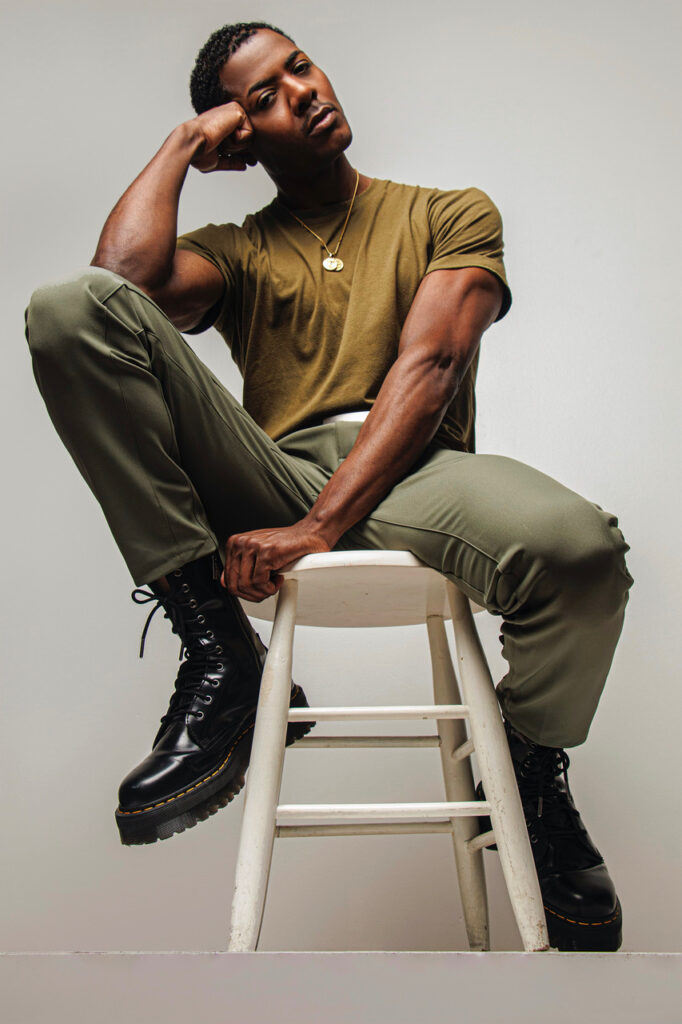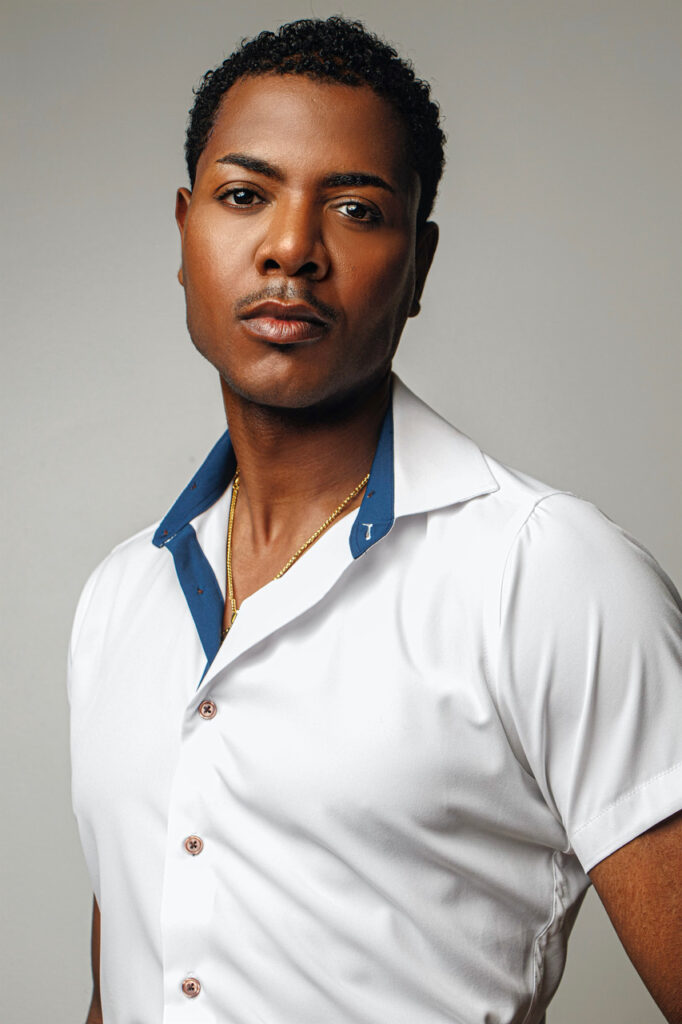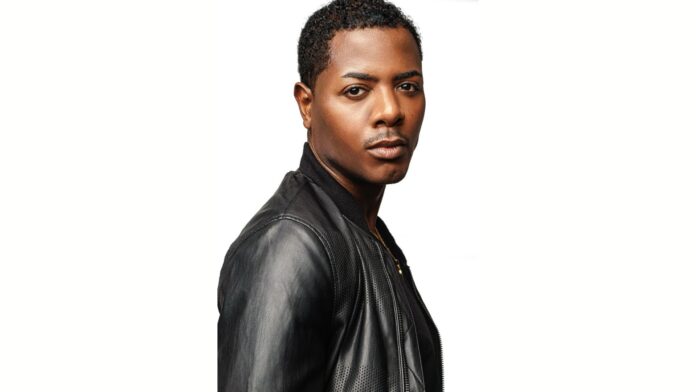It’s time to get Fringy! If you’re a long-time reader, you know that I love the Philadelphia Fringe Festival. It’s a chance to experience all types of artists, singers and dancers, magicians and acrobats, plays and movies and all sorts of shows on the Fringe, sometimes free, always reasonable (Shameless plug: I’m hosting a “Best of the Fests” compilation of movies from The Women’s Film Festival on Sept. 27). Gunnar Montana is always a must see for me, and there are plenty of queer artists and queer-themed performances including this week’s Portrait, Quentin Charles Williams. In the semi-autobiographical solo performance, “Where Sunflowers Dance,” Williams plays Grandaddy Malik, a crotchety old gay painter, writer and retired professor, who finds himself unexpectedly pulled back to present-day Philadelphia and his younger self, full of swagger and ambition, navigating the vibrant world of circuit parties. The mesmerizing performance blends standup, improv, burlesque, spoken word and multimedia projections as the audience is taken on a whirlwind journey. Some responses from this conversation have been edited for length or clarity.
I see that we’re both from North Jersey. I’m from Passaic originally and my extended family are all still up in Montclair, Teaneck, the Oranges, etc.
OK! I’m from South Orange. My high school, Columbia High, used to run track against your school in Passaic. And from what I recall, y’all had a pretty strong track team.
How did you end up here?
I moved to Philly for college, Temple University. That was back in 2005 and I finished in 2010. It was sort of destined for me to go there because both my parents went to Temple. That’s where they met.
How sweet! So tell me a little bit about growing up in South Orange.
My neighborhood was very diverse. It was considered to be very safe. It was very artistically inclined. Lauryn Hill went to my high school. Something kind of cool: In third grade, I got one of the math textbooks that she had used and it had her name scribbled on the inside cover. I also went to school with a couple of entertainers that are very popular now. One’s an actor — Rotimi from the shows, “Power” and “The Chi” — and the other is SZA. I ran track with SZA.
That is pretty cool.
It was a public high school. It wasn’t a performing arts school, but we had a very robust theater program and TV production program. And that’s kind of how I got into the arts. It was a special place because white flight hadn’t happened in our town and race relations were relatively good. When I went to Temple, for example, about 10 students from my school — Columbia High School — all went to Temple, all of different races, and we all still remained friends. You know, it’s a close, tight-knit small town, but also it’s super close to New York City, so we had that benefit too.
How would your mom have described you as a kid?
I love that question. I think my mom would have described me as quiet, shy, sensitive, artistic and outdoorsy. I liked to play in the mud and dig for worms and catch frogs and had every pet that you could imagine that was not a cat or a dog, because one of my sisters was terrified of those two. I was the second oldest of five and I think she would also describe me as a caretaker of my siblings and a fantastic cook!
That’s a great trait!
When I was growing up, my mom was working at IBM for some of my early years while starting her own accounting and CPA practice. So as a way to help out with the family — and also because I love to eat — I learned how to cook. It’s kind of crazy to believe that they trusted me with the family cooking in second grade, but they did! Though it was under the supervision of my grandmother. I started cooking casseroles and stuff like that at first. And then I got more into the more challenging, chef’s reality show type stuff.
I’m impressed. I never learned to cook because I rebelled at what I thought was being delegated as girl’s stuff. Now both of my brothers cook while I’m heating ramen noodles!
Listen, now they have DoorDash and Grubhub and all those ready-to-eat meal things that are actually healthy. And I’m guessing that you don’t have to do the cooking at Thanksgiving so it’s not a bad thing! You don’t have to worry about that stress!

True that! So what kind of things were you into in school?
I was really into theater. I didn’t do musicals because I couldn’t sing. But I took theater classes and I also took video production classes. One of my mom’s friends was a relative of the gentleman, Mr. Muller, who ran the video production course. Usually only juniors and seniors could get in that course, but my mom’s friend was able to pull some strings and get me into the course my freshman year. So that’s really how I got into making films and acting. I also was privileged enough to be cast in a Disney show when I was in school in my formative years. So that was a really eye-opening experience. I recognized then that I definitely wanted to continue to act and be involved in the entertainment world in some capacity. But as you can imagine, child acting or anything that requires, you know, being on set for long periods of time is a huge investment on the parent’s side as well. And like I said, I had four siblings and it just wasn’t logistically possible for them to take me on every single audition. So I had that really great experience and then we backed off a little.
What was the Disney show?
It was called “Z-Games.” It was a reality game show for children. They had segments of original games, made up by ordinary kids. There was also a section where the kids on the show would make up games for each other to complete.
Fun! What was your major when you went to Temple?
So funny enough, I started off as biology pre-med because my parents really, really, really wanted a doctor in the family. And I was into animals and science and stuff like that. So they figured it would be a good path for me to take. But the one thing I didn’t realize about biology is that it requires a whole lot of math. I quickly decided that the labs and standing around for long periods of time wasn’t for me. So I switched over to marketing my sophomore year.
I had plenty of conversations with my parents, where they were like, “Why don’t you study English or journalism or acting, theater, something that you’re really passionate about?” And they had a lot of wisdom in that recommendation. But the way that I saw it, at the time I was a working actor and getting booked. But I wasn’t making a living off of it, so let me learn the skills that I’ll need on the business side of things in order to eventually run my own production company. So that’s the route that I took.
And all along, I was working for a magazine company in New York City called Giant magazine and then later with 215 Magazine here in Philadelphia, helping with the start of the Roots picnic and getting a chance to meet celebrities like Zoë Kravitz and a lot of others. I soon recognized that journalism wasn’t really the direction that I wanted to take either. But yeah, that’s what I was doing in college.
I forgot to ask, what did your father do?
My dad was an FBI agent in New York City.
What?
Yeah, he was always the coolest dad on the field trips’ chaperones list.
Was he allowed to talk about work or was it hush-hush?
He was allowed to talk about it. He’s a storyteller in his own right. He has wonderful stories that he has already changed the names of the people involved and he’s omitted some of the details. But yeah, he loves telling stories about his career in New York City.
Speaking of changing the names. Give me your best celebrity encounter and then your worst celebrity encounter and you can change the names if you want.
Oh my goodness. I’ll start with the best celebrity encounter. After college, I bounced around a little bit. I worked in New York City for five years. I worked in Charlotte for a few years after that. And then I came back to Philly in 2017 to take a job as marketing director at a radio group here, a company called Radio One. While I was there, I had an opportunity to produce a concert. It was Megan Thee Stallion’s first major market concert outside of her home state. And It was right on the eve of the release of her first major album. She blew us all away because honestly, except for seeing how well she was doing on Spotify, I didn’t know anything about her. I did my research in producing the show and I was really impressed with her talent on her records, but it’s a totally different thing to be able to carry a live performance. And she just blew everybody away. She was a superstar instantly. And she also was super sweet. So it was really beautiful to see how her career just exploded after that show.
And worst celebrity encounter? In New York City, I was working at a radio station called WABC Radio. And we had a simulcast for Don Imus on the Fox Business Network. I won’t say who but I had a pretty embarrassing encounter with one of the people who was on the show. As you can imagine, I was one of the few Black people working at this predominantly white, very right-wing radio station and talk show. There was a Don Imus golf outing and everybody was drinking when somebody decided to make a comment that really made things very uncomfortable for the rest of the golf outing.
Ugh, was it one of those hand-you-the-keys-so-you-could-park-his-car moments?
No, it was a lame joke insinuating that I wouldn’t be able to play golf because I was Black. Like, “Hey, give this guy a club and see if he can hit the ball a couple of feet!”
Sheesh, so let’s switch gears and talk about your company, DragonTree Media.
I started Dragon Tree Media in 2009 when I was a junior at Temple University. I’d always known that I wanted to run my own production company. But at the time that I started it, I didn’t know anything about running a company, nor did I know anything about the business. My arrogance was quickly humbled and I realized I should probably work for larger media companies first so that I could learn the ropes and get some experience.
So that’s what I did. I went off to New York, and I worked for several companies there. And then I came back to Philly and took a job as the marketing director at Radio One. I was there for about three years, and then the pandemic hit. I had to rethink new revenue streams and I was like, why don’t I just start my own company. So that’s what I did in 2020 and we’ve had the opportunity and privilege to work with numerous great organizations like the 2020 census initiative, Philly Counts, helping them to strategize guerrilla marketing and grassroots initiatives to help them overcome the challenge of doing a census during COVID.
We do a lot of event production, and video production specifically for social media. We’ve done talk shows and live events of other sorts, but we’re transitioning the company to focus our production services more on the theater world and film world.
And you’re also doing a show at the Fringe!
Yes, the Fringe Show was inspired from a real-life therapy session that I had where I was recognizing that there are some things in my life, some traumas that I’ve experienced in my formative years that I’m trying to work through and let go of, particularly one situation between my father and I, and really looking to repair that relationship. So I started writing this hypothetical situation of what it might look like if I were to engage my father in this sort of conversation. And the more that I wrote, I was like “Let me just write a play.” One of my friends said, “The Fringe Festival application period is closing soon, you should submit your play.” And I thought, “Why not?” It’s a fictionalized version of this dynamic between the main character, Malik, and his parents. It takes place in the future, in the 2070s when Malik is 80 and so it was an opportunity for me to think, what if I didn’t make the hard choice of having this conversation with my parents and mending some of the relationship that had been strained in the past as a result of, you know, a number of things, but certainly my sexuality being one of them.
The play is a series of monologues between Granddaddy Malik, and his bed nurse, Cheryl. The audience is gonna be playing Cheryl in this conversation. And the second character, is the younger version of Malik in the 2020s with the audience playing the role of his therapist. So you get to see sort of two different mindsets and the audience gets a peek into what actually happened when Malik was younger that precipitated this sort of dynamic that Malik is now trying to reconcile at the end of his life. Malik is a painter and a poet and a retired professor and I’m a poet in real life. So there are moments in the play where Malik is reciting some of my original poetry, which for the sake of theater, is his poetry in the show.

What was your coming-out story?
I remember feeling very scared that I was going to lose family and friends, particularly since I grew up in a Christian Baptist household, and most of my friends were also practicing Christians. My parents responded fairly, well, it was complicated. It was very difficult for my mom to accept it, not that she said she didn’t accept it. What she literally said was, “I don’t understand your generation.” So that didn’t feel great. I was 24 at the time but I’d come out to my father when I was 21. So there was a three-year gap between me telling my dad and my mom. I just felt like my dad would be more accepting because he was born and raised in New York. I definitely found that he was more open and emotionally supportive. Whereas my mom needed to take a step away and really process the information that she got. And then we went to lunch a few days later to talk more in depth about it.
I assume the siblings were OK?
Actually, my younger brother is gay. And one of my youngest sisters told me that she’s sexually fluid, so yeah.
Cool. Alright, time for some totally random questions. Which of Snow White’s seven dwarfs would be you? Doc, Happy, Bashful, Sleepy, Sneezy, Grumpy or Dopey?
I would say Bashful. I’m easily embarrassed. I mean, not too many Black men would say that they blush, but I think that I definitely blush but I’m trying to get better at accepting compliments.
Any scars or tattoos?
I’ve got plenty of scars, mostly from cooking. Some from just being an outdoorsy kid who would run down the block and scrape their knees or fall off the bike. But one time I was riding my bike in Philly when I was in college and a woman opened her car door without looking in the side view mirror and I was right there. I got nailed right under one of my ribs, and I literally stayed stuck on the door for a couple of seconds. That was super painful and I have a scar, right under my chest. And that’s probably my most glorious scar story.
Ouch! Last question, favorite motto or quote?
One of my favorite poets is Rumi, and he has a line from one of his poems that says, “The wound is the place where the Light enters you.”
Quentin Charles Williams will perform in “Where Sunflowers Dance” Sept. 26-28 at the Community Education Center, 3500 Lancaster Ave. For more information or to purchase tickets, visit phillyfringe.org/events/where-sunflowers-dance/.
